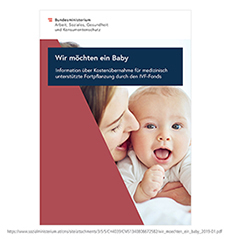“How can we make it happen? Can we even afford it?” …
Especially in difficult times like these, when the coronavirus pandemic is causing widespread economic and social insecurity, such considerations are thoroughly understandable. Many couples who wish to have children may have similar concerns, particularly in situations where costs are incurred long before the child is born.
This applies, above all, to couples facing infertility issues that require the use of assisted reproduction techniques (ART). Needless to say, that the financial aspects play a central role for couples considering IVF treatment. Today, these couples may benefit from public financial support as well as from health insurance benefits.
Treatment at a private fertility center is always associated with costs that are, however, getting more and more affordable, thanks to the various financial support options that are available nowadays, including, for instance, eligible costs covered by the health insurance scheme, partial reimbursement etc. Thus, a far greater number of couples can get access to fertility treatment today.
Below you will find more detailed information on the currently available possibilities.
Financial Support by the Austrian IVF Fund
The Austrian IVF Fund is one of the ‘means’ aimed at reducing the financial burden on infertile couples who seek medical help to get pregnant. The fund covers the major share of a couple’s treatment cost, provided they meet a number of requirements. In addition, the treatment must be carried out at an IVF center that has a contract with the IVF Fund, i.e. fertility clinics or IVF centers that have been approved and comply with the provisions set out in the ‘Fortpflanzungsmedizingesetz’ (Austrian Law on Reproductive Medicine), such as NEXTCLINICS IVF Zentren Prof. Zech in Bregenz und Salzburg.
What are the requirements to be met by a couple to qualify for financial support from the IVF Fund?
• Marital status: married or living in a registered civil partnership or as partners in a consensual union (since January 1, 2015, lesbian couples are also entitled to financial support from the IVF Fund: the woman who wants to carry the pregnancy must fulfill the corresponding requirements).
• Any treatment must be justified by an appropriate medical indication: infertility in the woman/and or in the male partner must have been diagnosed by a specialist
• There is no entitlement to benefit from financial support if the woman / man (vasectomy) has previously undergone voluntary sterilization, i.e. sterilization that was not medically indicated
• Age limit: There is no funding for woman older than 40 years and male (or female) partners over the age of 50
• Health insurance coverage and proof of citizenship
• Austria must be the main residence (of at least one of the members of the couple)
• The Fund finances up to 70% of the costs incurred for each attempt (for a maximum of four attempts). An attempt corresponds to a complete treatment cycle. Exception: Funding for more than four attempts is possible, provided that at least one successful pregnancy has been achieved through the use of IVF techniques.
• The outcome of each attempt is to be reported to the IVF clinic that provided the treatment within 3 months. Please note: If you fail to report the outcome of a treatment cycle, you have to return the funding that you have received to the IVF Fund.
(→ Details on the individual items)
Financial contribution by statutory health insurance providers
In addition to public funding, many statutory or private health insurance companies cover part of the treatment cost – some of them cover up to two-thirds or more. However, this is not always the case and should be clarified beforehand with the respective health insurance provider.
An example: At NEXTCLINICS IVF Zentren Prof. Zech in Bregenz and Salzburg, couples from Germany are provided with assisted fertility treatment in accordance with the German Embryo Protection Act (Deutsches Embryonenschutzgesetz). They thus have the possibility to contact their health insurance provider in order to seek reimbursement of medical expenses incurred abroad up to the amount that would have been paid had they obtained that treatment at home in Germany. As a general rule, such matters should always be discussed with the respective health insurance provider before embarking on an IVF cycle. During the initial consultation at the IVF center, the couple’s medical situation will be thoroughly examined. Thus, the resulting details such as therapy costs and the cause(s) underlying the infertility can be provided to the insurance company within a very short time.
The significance of the role played by reproductive medicine, today and in the future, is and remains undisputed
According to experts, both the current and the anticipated demographic change indicate a very problematic and, to some extent, dramatic development. We are currently witnessing a rapid decline in birth rates (baby boomer generation in the 1960s, birth rates dropped in the 1980s, birth rates dropped in the mid-1990s), whereas the mean age of women at the birth of their first child is rising continuously (in Germany and Austria to 30 years and older), thereby bringing about a fundamental change in the population’s age structure (at regional and national levels).
The percentage of employed people is in constant decline with far-reaching consequences for job market, pension scheme etc. At the same time, there are many couples faced with infertility or subfertility who deeply wish to have a child. And let’s not forget the large number of same-sex couples with an unfulfilled desire for children. Helping those couples should, first and foremost, be a moral obligation. However, against the backdrop of the social developments within our society, such help should also be a socio-economic priority, given the need to tackle the challenges of demographic changes.
A comment by Dr. Maximilian Murtinger, Medical Director of NEXTCLINIC IVF Zentren Prof. Zech – Bregenz:
“The use of medically assisted reproduction techniques is an appropriate means to counteract the impact of demographic change on our society. One good example here is Israel, where currently already up to 10% of the children are born through medically assisted reproduction. But in European countries, too, reproductive medicine has already become an integral part of social policy. I am thinking in particular of countries such as Norway, Sweden and Finland. We need children, and in this context, we should not only consider IVF treatments, but also place great emphasis on all kinds of help and assistance. Modern medicine is open. Children are the most important goal in our society.”
In summary, it can be said that reproductive medicine is of paramount importance today and certainly will remain so in the future. This makes it all the more important to provide involuntarily childless couples with financial support from the public sector and the health insurance providers, the latter of which may also involve the introduction of new insurance models to fundamentally increase the awareness and acceptance of medically assisted procreation techniques in society as a whole.
(Literature available from the author / scientific coordinator NEXTCLINIC IVF Zentren Prof. Zech – Bregenz)
Links:
» “And here she is… THE LOVELY LOUISE”
(Post | https://www.fertility-treatment-blog.com)
(Homepage | https://www.fertility-treatment-blog.com)
(Site | https://www.fertility-treatment-blog.com)


















